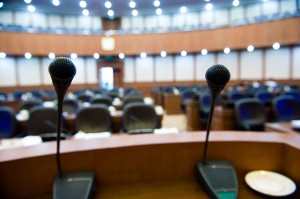Invoking the Good: Greece v. Galloway Three Years Later

Today marks the third anniversary of the US Supreme Court ruling in Town of Greece v. Galloway, which essentially concluded that “opening town board meetings with a prayer offered by members of the clergy does not violate the Establishment Clause when the practice is consistent with the tradition long followed by Congress and state legislatures.” In other words, Christian prayers before city town hall meetings were permitted to continue without consequences. In an effort to be inclusive of everyone, the majority decision stated that the invocations must not “denigrate nonbelievers or religious minorities, threaten damnation, or preach conversion” and welcomed invocations by anyone who wished to give one, regardless of their faith. Despite the inclusive language, many humanists and secularists were upset by the ruling and would have preferred the Supreme Court to rule against any type of prayer during government meetings.
Three years later, the Town of Greece v. Galloway has had several surprisingly positive effects on the humanist community and other non-theistic communities.
The Humanist Society, an adjunct of the American Humanist Association, saw the decision as a chance for humanists to deliver secular invocations at city council meetings, inaugurations of public officials, and before public events and thus created a program to endorse such qualified individuals. Unlike many sectarian prayers, which can leave out those of different religious faiths as well as those with no religion at all, secular invocations affirm values that all of us share, such as acceptance, respect, and dignity. There are currently 156 secular invocators endorsed by the Humanist Society, and the number of individuals delivering secular invocations continues to grow. As a result of their secular invocations, individuals have increased the visibility of the humanist community at both the local and national level and spread our own positive message to those who were either unfamiliar with humanism or had negative associations with it.
Robert Ray, president of the Humanists of the North Puget Sound, delivered the first-ever humanist invocation to the Marysville City Council by quoting the Washington State constitution, Thomas Jefferson, and Robert Ingersoll. Humanist celebrant and chaplain Chris Allen’s secular invocation to the Orlando City Council in Florida focused on giving thanks to government workers, volunteers, and his community. Cheryl Kolbe, president of a Freedom From Religion Foundation chapter in Portland, Oregon, gave a secular invocation in which she asked the board members of Clark County to be as inclusive as possible and to treat everyone with respect regardless of their belief or non-belief in God. And ever since May 5, 2014, David Williamson, president of the Central Florida Freethought Community, has delivered several secular invocations himself as well as mobilized members of his local group to deliver invocations in the Orlando area. In fact, the Central Florida Freethought Community’s website has catalogued a total of sixty-five humanist invocations delivered since then.
One of the most exciting humanist invocations was delivered just last month at the Iowa State Capitol Building to Iowa legislators. Roxanne Gissler, president of the Humanists of Linn County, celebrated “Reason on the Hill” by delivering the first-ever humanist invocation at the Iowa State Capitol. In it, she called for the inclusion of everyone and wanted to “show her elected government officials that secularists and secular-friendly allies are found throughout Iowa, and that there are more constituents like this than they realize.”
It is time for us humanists to stand up and make sure that our local legislatures are inclusive of everyone, religious and nonreligious alike. Delivering humanist invocations is a great start and the perfect avenue for sharing the positive message and tenants of humanism while simultaneously taking a stand for the separation of church and state.
